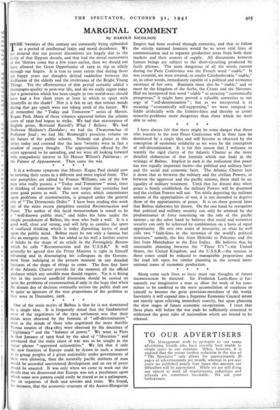MARGINAL COMMENT
By HAROLD NICOLSON THE 'twenties of this century are constantly being upbraided as a period of intellectual laxity and moral decadence. We are assured that our present discontents are largely due to the levity of that flippant decade, and that had the moral earnestness of the 'thirties come but a few years earlier, then we should not have allowed the Great Opportunity of 1919 to slip so silkily through our fingers. It is true to some extent that during those ten happy years our thoughts drifted rudderless between the disillusion of the elderly and the irrelevance of the Bright Young Things. Yet the effervescence of that period certainly added a champagne-quality to post-war life, and do we really regret today that a generation which has been caught in two world-wars should have had a few short years at least in which to sport with Amaryllis in the shade? Nor is it fair to say that serious minds during that gay epoch were not taking stock of the future. We all remember the " Today and Tomorrow " series of Messrs. Kegan Paul. Many of these volumes appeared before the solemn Dotes of 193o had begun to strike. We had that masterpiece of English prose, Bertrand Russell's What I Believe. We had Professor Haldane's Daedalus ; we had the Thrasymachus of Professor Joad ; we had Mr. Roxburgh's prescient volume on the future of the public schools. Nobody can glance at this series today and contend that the later 'twenties were in fact a meadow of empty thought. The opportunities offered by the series appeared to be unending, and we were all looking forward with sympathetic interest to Sir Horace Wilson's Palimtrus: or the Future of Appeasement. Then came the war.
* * * *






















 Previous page
Previous page